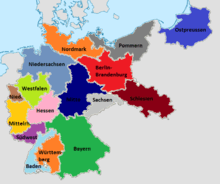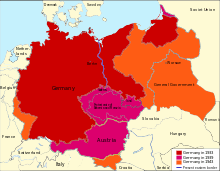1941–42 Gauliga
| Season | 1941–42 |
|---|---|
| Champions | 25 regional winners |
| German champions | FC Schalke 04 |
|
← 1940–41 1942–43 → | |

The 1941–42 Gauliga was the ninth season of the Gauliga, the first tier of the football league system in Germany from 1933 to 1945. It was the third season of the league held during the Second World War.
The league operated in twenty-five regional divisions, five more than in the previous season, with the league containing 265 clubs all up, 40 more than the previous season. The league champions entered the 1942 German football championship, won by FC Schalke 04 who defeated First Vienna 2–0 in the final. It was Schalke's sixth German national championship and its last in the Gauliga era.[1]
The 1941–42 season saw the eighth edition of the Tschammerpokal, now the DFB-Pokal. The 1942 edition was won by TSV 1860 München, defeating FC Schalke 04 2–0 on 15 November 1942.[2]
The number of Gauligas, twenty-five, increased by five compare to the previous season because of the introduction of two new Gauligas and the sub-division of three existing ones. The Gauliga Wartheland, covering the Reichsgau Wartheland, and the Gauliga Generalgouvernement, covering the General Government, were created in the areas annexed by Nazi Germany and in occupied Poland.[3] The Gauliga Generalgouvernement was only ever played as a knock-out competition of the local district champions and never in league format.[4]
Of the sub-divided Gauligas the Gauliga Schlesien was split into the Gauliga Oberschlesien and Gauliga Niederschlesien, the Gauliga Mittelrhein was split into the Gauliga Köln-Aachen and Gauliga Moselland and the Gauliga Südwest was split into Gauliga Hessen-Nassau and Gauliga Westmark.[5] As part of Nazi Germany's expansion in occupied Western Europe clubs from Luxembourg entered the new Gauliga Moselland while French clubs from the Lorraine region entered the new Gauliga Westmark. Luxembourgian club FV Stadt Düdelingen, known as Stade Dudelange before and after the club's participation in the German league system, went on to win the inaugural championship of the Gauliga Moselland.[6][7]
The 1941–42 season saw another increase in participation of military and police teams, especially in the eastern regions. Gauliga champions like LSV Pütnitz, LSV Olmütz and LSV Boelcke Krakau were associated with the German air force, the Luftwaffe, LSV standing for Luftwaffen Sportverein. HUS Marienwerder was a club of the non-commissioned officers academy, HUS standing for Heeres-Unteroffiziers-Schule while SG SS Straßburg was associated with the SS, the Schutzstaffel. Polizei Litzmannstadt, in turn, was a club of the Ordnungspolizei, the uniformed police force in Nazi Germany.[8]
In the part of Czechoslovakia annexed into Germany in March 1939, the Protectorate of Bohemia and Moravia, a separate Czech league continued to exist which was not part of the Gauliga system or the German championship.[9][10]
Champions

The 1941–42 Gauliga champions qualified for the knock-out stages of the German championship, replacing the group format of the previous Gauliga seasons. Blau-Weiß 90 Berlin finished the tournament in third place, defeating Kickers Offenbach 4–0 in the third-place game while First Vienna FC and FC Schalke 04 contested the final which the latter won.[4][8][11]
FC Schalke 04 won their ninth consecutive Gauliga title, Stuttgarter Kickers their fourth, VfB Königsberg and Kickers Offenbach their third while SV Jena, Borussia Fulda and VfL 99 Köln defended their 1940–41 Gauliga title. However, Kickers Offenbach, Borussia Fulda and VfL 99 Köln achieved their 1941–42 titles in re-sized or renamed leagues.[5]
- ‡ Denotes newly introduced Gauligas for the 1941–42 season.
- # Denotes Gauligas created through sub-division of existing Gauligas for the 1941–42 season.
- ¶ Formerly the Gauliga Ostmark.
- † Formerly the Gauliga Hessen.
References
- ↑ "(West) Germany -List of champions". Rsssf.com. Retrieved 17 January 2016.
- ↑ "ALLE DFB-POKALSIEGER" [All German Cup winners]. dfb.de (in German). German Football Association. Retrieved 15 January 2016.
- ↑ "Where's My Country? Polish clubs in the German football structure 1940-1944". Rsssf.com. Retrieved 17 January 2016.
- 1 2 "Gauliga final tables". f-archiv.de (in German). Retrieved 17 January 2016.
- 1 2 kicker Allmanach 1990, page: 243-245
- ↑ "Where's My Country? French clubs in the German football structure 1940-1944". Rsssf.com. Retrieved 17 January 2016.
- ↑ "Where's My Country? Luxembourg clubs in the German football structure 1940-1944". Rsssf.com. Retrieved 17 January 2016.
- 1 2 "Germany 1941–42". claudionicoletti.eu. Retrieved 17 January 2016.
- ↑ "Czechoslovakia / Czech Republic - List of League Tables". Rsssf.com. Retrieved 18 January 2016.
- ↑ "Where's My Country? Czech clubs in the German football structure 1938-1944". Rsssf.com. Retrieved 15 January 2016.
- ↑ "German championship 1942". Rsssf.com. Retrieved 17 January 2016.
Sources
- kicker-Almanach 1990 (German) Yearbook of German football, publisher: kicker Sportmagazin, published: 1989, ISBN 3-7679-0297-4
- 100 Jahre Süddeutscher Fußball-Verband (German) 100 Years of the Southern German Football Federation, publisher: SFV, published: 1997
- Die deutschen Gauligen 1933–45 – Heft 1–3 (German) Tables of the Gauligas 1933–45, publisher: DSFS
External links
- Das Deutsche Fussball Archiv (German) Historic German league tables